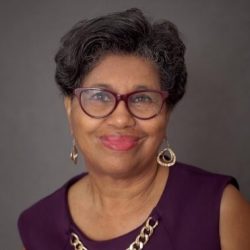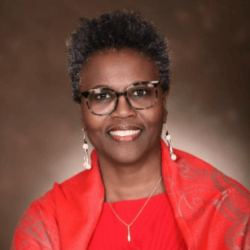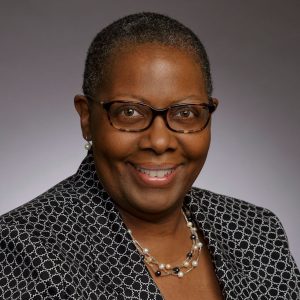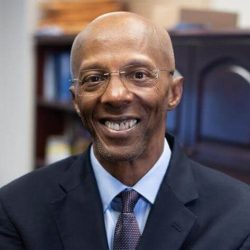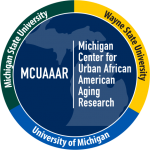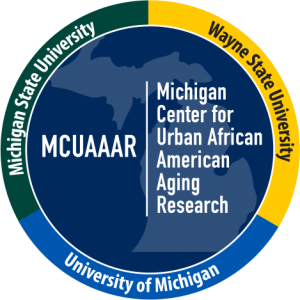
Michigan Center for Urban African American Aging Research
HBCU Partners
More about Sandra Edmonds Crewe
Sandra Edmonds Crewe is dean and professor of social work at Howard University. Dr. Crewe previously held the position of interim dean, and associate dean for academic and student advancement. She has research, scholarship, and public advocacy in the areas of caregiving, aging, ethnogerontology, welfare reform, and social welfare history. She has numerous publications in these areas. Dr. Crewe holds both her bachelor’s and master’s degrees in social work from the National Catholic School of Social Service (Catholic University of America) and a Ph.D. in Social Work from Howard University. She is a 40 year member of the Academy of Certified Social Workers. She also holds a certificate from the Harvard Institute of Leadership and Management in Education through a Council on Social Work Education fellowship. Prior to joining the faculty, she served in executive level positions in the field of public and assisted housing and was instrumental in developing self-sufficiency programs as well as health and well-being programs for older persons. Dr. Crewe is a long standing trustee for the Maryland Affordable Housing Trust. She serves as secretary and member of the board of the American Association of Service Coordinators. Additionally, she serves on the board for the National Association of Deans and Directors. Dr. Crewe is a founding member of the HBCU Schools of Social Work Network. She is co-lead of the network addressing eradicating social isolation, a grand challenge of the American Society of Social Work and Social Welfare Dr. Crewe is a NASW Pioneer.
Dr. Learotha Williams Jr.
Professor of African American History, Department of History, Political Science, Geography and Africana Studies, Tennessee State University
BA, History/African American Studies, Florida State University
MA, History/African American Studies, Florida State University
PhD, African American History, Post-Civil War America, Florida State University
More about Learotha Williams Jr.
Learotha Williams, Jr.,is a scholar of African American, Civil War and Reconstruction, and Public History at Tennessee State University. At TSU, he teaches courses that explore Civil War and Reconstruction history, African Americans in Public Memory, Black Politicians, Civil Rights, 20th Century Black Intellectuals, African Americans in Tennessee, Slavery and Emancipation in Middle Tennessee. Williams has worked as a Historic Sites Specialist for the State of Florida, acted as coordinator for the African American Studies Program at Armstrong Atlantic State University, and served as trustee of the Historic Savannah Foundation in Savannah, Georgia. He also spearheads the North Nashville Heritage Project, an effort that seeks to encourage a greater understanding of the history of North Nashville, including but not limited to Jefferson Street and its historic relationship to the greater Nashville community. Since his arrival in Nashville, he has served on the Boards of the Friends of Fort Negley and the Metro Historical Commission Foundation.
More about Jenny Jones
Dr. Jenny Jones is dean and professor of the Whitney M. Young, Jr., School of Social Work at Clark Atlanta University and graduate faculty affiliate at Florida State University. Dr. Jones has more than 23 years of professional social work experience in higher education, public child welfare service systems, HIV/AIDS community-based multiservice organizations, and applied research. Her primary research examines administrative practice (including supervision and organizational culture) and its impact on service delivery and child well-being. In addition, her interests include financial capability and asset building, which considers the integration of financial and economic principles and interventions in direct practice with low-income families. Dr. Jones’ research productivity includes extensive involvement as principal investigator or co-investigator on nine externally funded projects totaling $10.5 million in grants and contracts over the past 23 years.
Dr. Jones has sustained a well-respected research and community service career grounded in culturally responsive practices. She has authored or edited more than 47 scholarly publications, reports, and monographs. Dr. Jones is nationally and internationally known for her work in child welfare and HIV/AIDS. She serves on the CSWE Board of Directors, is a former member of the CSWE Diversity Commission and the CSWE Diversity Center Advisory Board, and is former director of the CSWE Minority Fellowship Program.
More about Susan Frazier-Kouassi
Susan Frazier-Kouassi is the director of the Texas Juvenile Crime Prevention Center at Prairie View A&M University (Prairie View, Texas). Dr. Frazier-Kouassi relocated to Texas in 2015 after spending more than 17 years in higher education administration in various departments at the University of Michigan. Within the School of Public Health, she has served in the capacity of Director of Training and Community Engagement in the Prevention Research Center of MI; Co-Program Manager, Certificate Program in Population Health and Health Equity; Co-Investigator, Future Public Health Leaders Program (CDC-funded); and Project Manager, Center for Global Health (Ghana-Michigan Collaborative Health Alliance for Reshaping Training, Education & Research Project (Bill Gates-Funded). Before her tenure at the School of Public Health, she served as the Program Manager for the Program for Research on Black Americans in the Institute for Social Research, Dr. Frazier-Kouassi holds her BA degree in Psychology from the University of Michigan, and her MA and PhD in Social Psychology from Boston University. She is a long-standing member of the American Public Health Association. In her current position as Director, she is engaged in research, training, policy and advocacy to help youth from entering or re-entering the juvenile justice system. Additionally, she serves as the College of Juvenile Justice’s representative for the university’s Wellness in Houston project, a state-funded initiative with an outreach towards children, youth, and seniors to promote health, and wellness in five counties throughout Texas.
More about William Southerland
Dr. William Southerland is Professor of Biochemistry in the Howard University College of Medicine. He is also the Director of the Howard University Center for Computational Biology and Bioinformatics (CCBB), Interim Director of the Howard University Center for Applied Data Science and Analytics (CADSA), and the Principal Investigator of the Howard University Research Centers in Minority Institutions (RCMI) Program. Dr. Southerland’s research interests include utilization of data science principles to better understand chronic disease burden among different ethnic groups and investigations on the impact of gene sequence variation on disease expression among different ethnic groups. Additional interests include investigating the rules of molecular recognition and interactions using molecular dynamics simulation to correlate conformational changes with time-dependent changes in atom-atom contacts between interacting species and with any associated changes in time-dependent interaction energies. This approach is used to study interaction mechanisms of small molecules with both proteins and DNA and has important implications for design of therapeutic agents. Also, of interest is the utilization of molecular dynamics and time-dependent interaction energy calculations to decode the nucleotide sequence dependency on ligand recognition by DNA. Additional interests include the design of proteins with increased thermal stability for application to industrial, environmental and diagnostic arenas.
